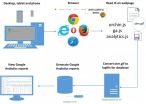Trends in plant biodiversity data online
2014-11-14
(Press-News.org) Today's herbaria, as well as all other collections-based environments, are now transitioning their collections data onto the web to remain viable in the smartphone-in-my-pocket age. A team of researchers have examined the importance of these online plant-based resources through the use of Google Analytics (GA) in a study that was published in the open access Biodiversity Data Journal (BDJ).
The amount of plant biodiversity resources freely accessible has exploded in the last decade, but validating an impact factor for these web-based works has remained difficult. A new paper examines usage trends across 15 different GA accounts, which are spread (via consortia) across 451 institutions or botanical projects, comprising over five percent of the world's herbaria. As it turns out, the data are more glamorous than just the deceased plants on a shelf.
The 15 plant data websites examined showed widespread usage, each one visited by users in over 100 countries, and some in over 200 countries, totaling 4.5 million sessions in the past year. Usage is not restricted to desktop computers either; access on mobile and tablet devices has been growing steadily on all sites examined, indicating that these sites are not only useful to people when they're in their offices.
VIDEO:
This video shows the shift in browser use by Tropicos of
users over a five year period that reveals a slow-motion-knife-fight in the ongoing browser wars....
Click here for more information.
According to Jones, the most interesting discoveries in this study was determining "what not to do." Among the most common GA mistakes were, "not knowing who owns the GA account, copying one GA code across different institutions and/or continents resulting in a global miasma of information, relying on one institutional GA code from front-door to back-door; meaning it tracked book-your-wedding information as well as specimen data, only deploying GA on the main page of a site, and ignoring the growth of mobile traffic".
Online plant databases can facilitate the democratization of botanical information through their availability, via open information that exceeds the speed of retrieval from a cabinet or bookshelf. Plus type specimens, no longer need to be shipped back and forth across the globe; thereby limiting wear and tear to important biodiversity objects. And importantly, all researchers can now share equal access globally, without travel, to a well established model at kingdom level.
INFORMATION:
Original source
Jones T, Baxter D, Hagedorn G, Legler B, Gilbert E, Thiele K, Vargas-Rodriguez Y, Urbatsch L (2014) Trends in access of plant biodiversity data revealed by Google Analytics. Biodiversity Data Journal 2: e1558. doi: 10.3897/BDJ.2.e1558
ELSE PRESS RELEASES FROM THIS DATE:
2014-11-14
Philadelphia, PA (November 14, 2014) -- In a study of blacks with normal kidney function, those with severe periodontal disease developed chronic kidney disease (CKD) at 4 times the rate of those without severe periodontal disease. The study that will be presented at ASN Kidney Week 2014 November 11¬-16 at the Pennsylvania Convention Center in Philadelphia, PA.
Periodontal disease is a chronic bacterial infection of the oral cavity, and it disproportionately affects African Americans. It's also been implicated as a potential risk factor for CKD. To investigate this ...
2014-11-14
Philadelphia, PA (November 14, 2014) -- Acute kidney injury occurs frequently in Ebola virus disease; however, providing hemodialysis to these patients was previously thought to be too risky because it involves large needles or catheters and potential contact with highly infectious blood. Clinicians recently accomplished the first known successful delivery of renal replacement therapy with subsequent recovery of kidney function in a patient with Ebola virus disease. Their protocol will be presented at ASN Kidney Week 2014 at the Pennsylvania Convention Center in Philadelphia, ...
2014-11-14
Prostate cancer patients carrying inherited mutations in the BRCA genes respond less well to conventional treatment, including surgery and/or radiotherapy - and they also have a lower survival rate than those who are non-carriers of these genetic mutations. Data from the study, which has been published in the journal European Urology, points to the need for new clinical trials aimed at targeting these mutations in order to tailor treatment for these patients.
The study has been led by David Olmos and Elena Castro at the Spanish National Cancer Research Centre (CNIO) ...
2014-11-14
November 14, 2014 - After the Boston Marathon bombings, more than 100 people were treated for trauma affecting the ears and hearing--with many having persistent or worsening hearing loss or other symptoms, reports a study in the December issue of Otology & Neurotology. The journal is published by Lippincott Williams & Wilkins, a part of Wolters Kluwer Health.
Dr. Aaron Remenschneider and principal investigator Dr. Alicia Quesnel of Massachusetts Eye and Ear Infirmary led a Boston-wide collaboration that reviewed the experience with otologic injuries caused by the 2013 ...
2014-11-14
This news release is available in German. For their study, the scientists investigated diseased nerve cells using high precision methods and subsequently simulated their electrical properties on the computer. In their view, medical interventions that preserve the structural integrity of neurons may constitute an innovative strategy for the treatment of neurodegenerative diseases.
Inside the brain, the nerve cells, which are also called "neurons," are woven into a network in which they relay signals to one another. Thus, neurons form intricate projections that enable ...
2014-11-14
This interview was conducted in August, released as a Web First, and appears in the November issue of Health Affairs.
Health Affairs has previously published Cheng's interviews with other world health ministers, including Thomas Zeltner of Switzerland (2010) and Chen Zhu of China (2012).
In this interview, Minister Nguyen noted that the Vietnamese parliament has voted to spend about 30 percent of the country's state fund for public health. However, that goal has yet to be reached. She also confirmed that Vietnam's 2008 Law of Health Insurance requires patients use ...
2014-11-14
Managing childhood asthma is difficult. Rather than giving daily medications -- even when children feel well -- many parents treat asthma only when symptoms become severe. This practice can lead to missed school days, trips to the ER and hospitalizations.
But a novel program at Washington University School of Medicine in St. Louis suggests that peer trainers who coach parents over the phone on managing their children's asthma can sharply reduce the number of days the kids experience symptoms. The program also dramatically decreased ER visits and hospitalizations among ...
2014-11-14
DUBLIN, Ireland, November 14th, 2014 - TB is an infectious disease that kills 1.5 million people each year, and smoking is the biggest driver of the global TB epidemic. Medical scientists at Trinity College Dublin and St James's Hospital in Ireland have unlocked the mechanism underlying the connection between smoking and Tuberculosis (TB). This discovery will considerably strengthen anti-smoking efforts to control TB and uncovers new therapy and vaccine options for TB. Their research has just been published in the top respiratory Journal, the American Journal of Respiratory ...
2014-11-14
Philadelphia, PA (November 14, 2014) -- Sleep apnea may accelerate kidney function decline in diabetic patients with kidney disease, according to a study that will be presented at ASN Kidney Week 2014 November 11¬-16 at the Pennsylvania Convention Center in Philadelphia, PA.
Type 2 diabetes often contributes to the development of chronic kidney disease (CKD). Because obstructive sleep apnea is common in patients with type 2 diabetes, investigators wonder whether disordered sleep might play a role in the link between diabetes and kidney dysfunction. To investigate, ...
2014-11-14
Philadelphia, PA (November 14, 2014) -- Many young patients with chronic conditions don't take their medications correctly, but 2 new studies point to ways to address such medication non-adherence. The studies will be presented at ASN Kidney Week 2014 November 11¬-16 at the Pennsylvania Convention Center in Philadelphia, PA.
In one study, researchers led by Frederick Kaskel, MD, PhD (Albert Einstein College of Medicine) and Oleh Akchurin, MD (Weill Cornell College of Medicine) looked to see how young patients are using smart phones to help them take their medications. ...
LAST 30 PRESS RELEASES:
[Press-News.org] Trends in plant biodiversity data online




